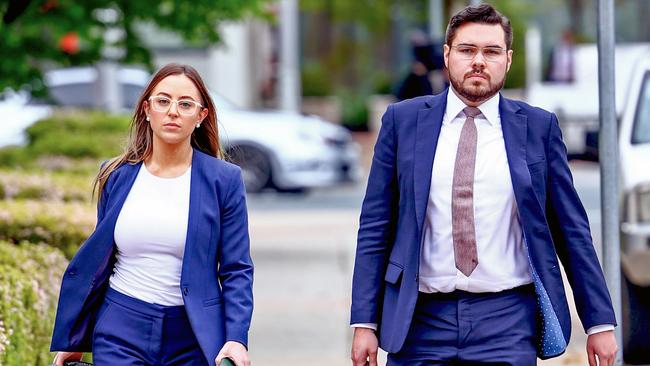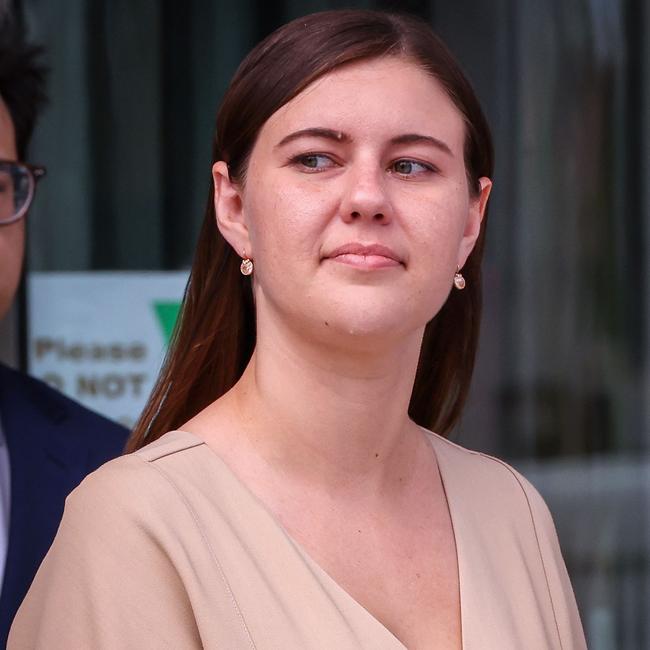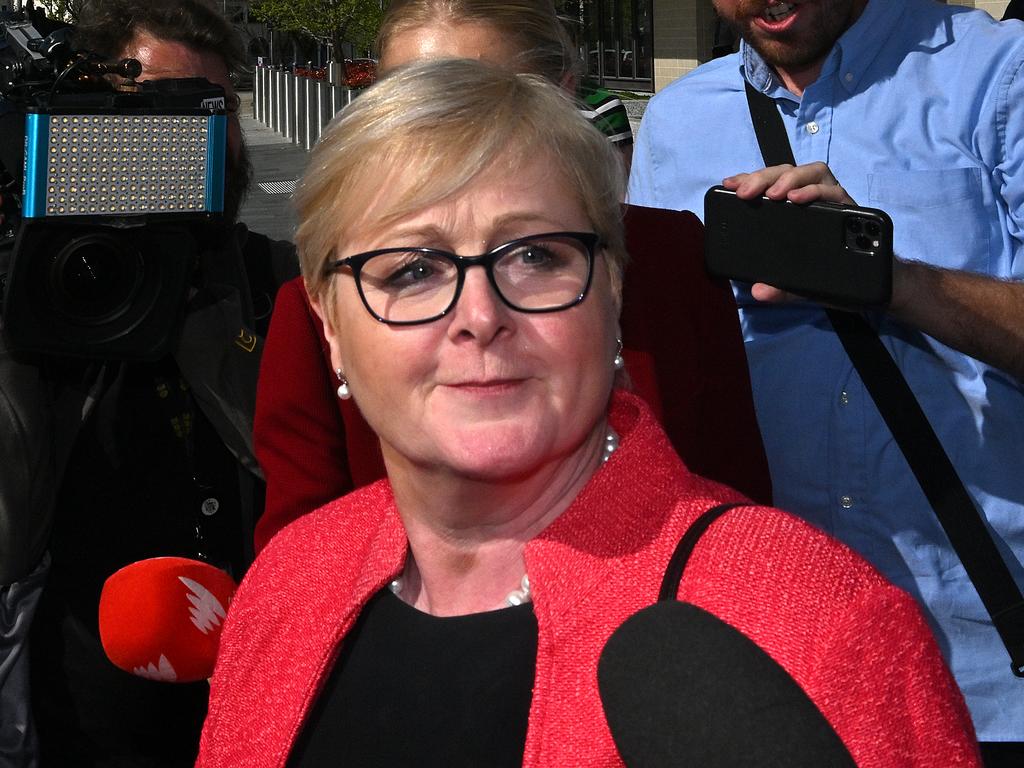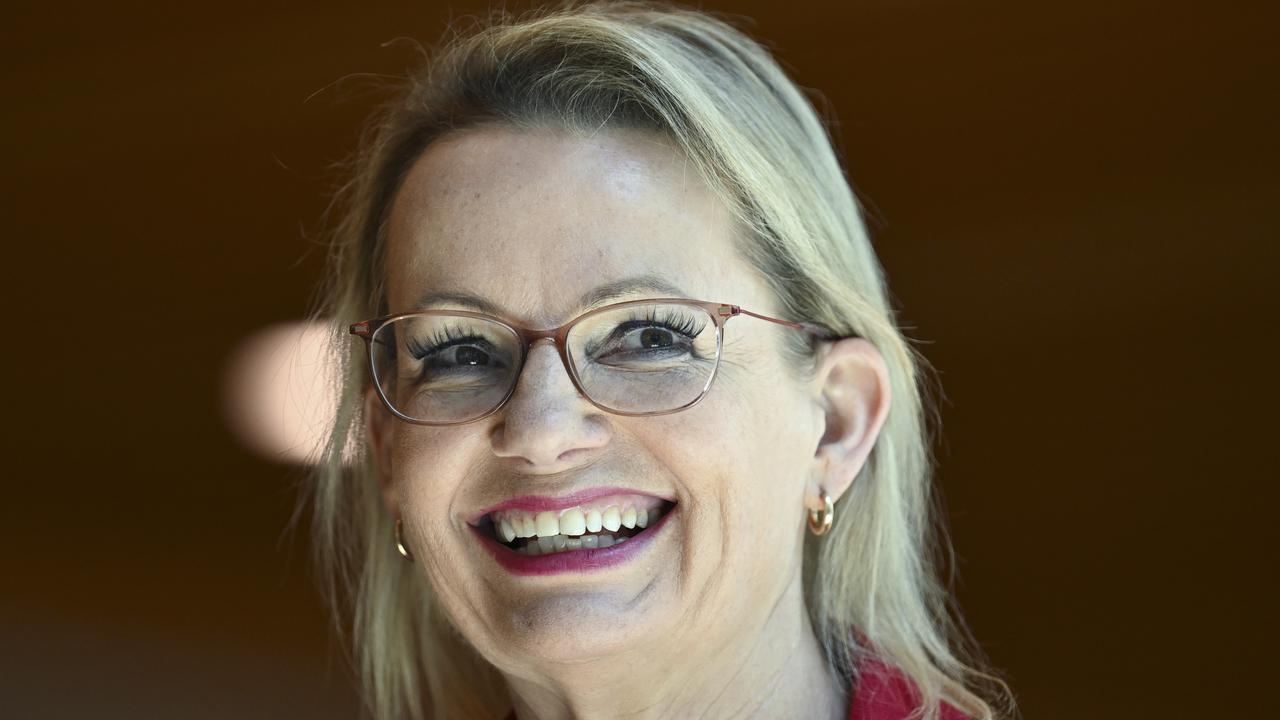Lehrmann trial: No DNA evidence to back Brittany Higgins, says defence lawyer
Rape accused Bruce Lehrmann’s lawyer has told jurors they can’t ‘be satisfied beyond a reasonable doubt’ that Brittany Higgins knows what happened to her.

Rape accused Bruce Lehrmann’s lawyer has told jurors they can’t “be satisfied beyond a reasonable doubt” that Brittany Higgins knows what happened to her in the office of Linda Reynolds in March 2019 and there is “no DNA and no evidence” to support her allegations of assault.
Barrister Steve Whybrow said in his closing statement to the ACT Supreme Court that Ms Higgins was an “unreliable” witness who said things that “suited her” and relied on talking points about trauma to cover up inconsistencies in her evidence.
In the final day of the rape trial before the jury is released to deliberate on its verdict, crown prosecutor Shane Drumgold said Ms Higgins was an “inherently credible witness” and if her allegation was a “fabrication”, she was “quite the actor” who had remained consistent in her story over the past 3½ years.
Mr Drumgold said Ms Higgins faced significant “political forces” in the wake of the alleged rape and was right to be scared for her career and to have moved forward carefully in her dealings with police.
Of the 51 witnesses who had been scheduled to give evidence, only 21 appeared. The defence did not call any witnesses.
Mr Whybrow said close examination of statements and accounts given by Ms Higgins, who alleges Mr Lehrmann raped her on the office couch of then cabinet minister Linda Reynolds on March 23, 2019, made the prosecution’s case “totally untenable”.
“That’s the fall-back position every time by Ms Higgins when she’s caught out by something … I was traumatised ... I couldn’t get out of bed … I was still processing,” he said.
“They may be entirely valid … or you might consider they’re talking points she’s sprouting every time the going gets tough.”
Mr Whybrow pointed to concessions made by Ms Higgins over the course of her evidence, including the length of time she kept the white dress she wore during the alleged rape in a plastic bag under her bed and when she had a panic attack about the alleged assault.
“Can you be satisfied beyond a reasonable doubt that it (the rape) did happen, when she said it, how she said it?” he asked.
“No DNA, no evidence. She is someone who is unreliable. Are you satisfied beyond a reasonable doubt?”
The barrister also pointed to Ms Higgins having told AFP officers, her former partner Ben Dillaway and the then chief-of-staff to senator Linda Reynolds, Fiona Brown, that she’d gone to see a doctor when she hadn’t to make her rape allegations “more believable … That was something Ms Higgins told to the police to make it sound more believable that she had been sexually assaulted ... she said it to Ms Brown to make it more believable.
“The reason you don’t (go to a doctor) is because you don’t need to. You haven’t had sex with anybody.”
Mr Whybrow said a photo of a bruise Ms Higgins said was on her left leg caused by Mr Lehrmann’s knee during the alleged rape was actually on her right leg.
He said while Ms Higgins said she’d taken a photo after the alleged assault on April 13, 2019, there was no medical evidence supporting whether the bruise would have remained 13 days later.

“Our contention is it [alleged rape] didn’t happen,” he said.
Mr Whybrow suggested Ms Higgins was trying to cover up what happened because it “would be pretty embarrassing” to be found passed out in a minister’s suite after “getting hammered”.
“That’s not good for your CV,” he said.
“Is there a reasonable possibility this complaint is being made because her ‘dream job’ is, from her perspective, in jeopardy?”
Mr Whybrow said the “kindest” interpretation of Ms Higgins’ actions was that she simply “didn’t know” what happened that night, given her level of inebriation.
“She doesn’t know what happened. You can’t be satisfied beyond reasonable doubt that she knows what happened,” he said.
However, Mr Drumgold said Ms Higgins was an “inherently credible witness” and if her allegations had been a “fabrication”, she was “quite the actor” who had managed to fool her own mother while remaining consistent in her story over the past 3½ years.
“When she couldn’t recall something, she said so … when she didn’t know an answer, she made it plain,” he told the jury.
“Ms Higgins didn’t seem to embellish her account of rape at all, she didn’t say it went for hours but just two to three minutes.”
Mr Drumgold said Ms Higgins faced significant “political forces” in the wake of the alleged rape and was right to be concerned for the continued viability of her political career if she proceeded with a formal complaint.
“It’s clear to say that this is a young lady who was in the middle of strong political forces and we say she was right to be scared, we say she was right to be cautious and we say she was right to move forward slowly and carefully in handing her life over to police,” he said.
Mr Drumgold pointed to evidence given by Senator Reynolds to the court on Monday, where it was revealed she texted one of Mr Lehrmann’s lawyers asking, “Hi, do you have the daily transcripts?” during Ms Higgins’ evidence before advising the defence counsel to check her former staffer’s text messages.
Mr Drumgold stressed that the defence was in no way involved in such “political forces” influencing the case.
He said the case before the jury wasn’t about political parties, parliamentary culture or the “#MeToo movement”, but rather “what happened between Ms Higgins and Bruce Lehrmann on a couch in room on Saturday the 23rd of March, 2019”.
While Mr Drumgold said Ms Higgins was a “genuine, upfront and honest” witness whom the jury could be “comfortable” believing, the same was not true for Mr Lehrmann.
He said Mr Lehrmann told numerous people different reasons for why he went to parliament with Ms Higgins about 1am on March 23, 2019, including that he was going to “drink whisky”, pick up his keys and work on a question time document.
Mr Whybrow in his closing statement showed the jury CCTV vision that captured Mr Lehrmann going through parliamentary security appearing not to have keys with him.
Mr Drumgold, however, said Mr Lehrmann had told numerous people, including security and police, that he had been “requested to pick up documents” and “work on question time documents”.
“Parliament was not sitting the entire week that followed; this was clearly not true,” Mr Drumgold said.
“We say this (parliament) was the most convenient place to get her (Ms Higgins) alone, not a sudden need to do some work in the middle of the night.”
Mr Drumgold also raised questions over Mr Lehrmann turning the lights of the office off and leaving Ms Higgins alone in the dark before being seen by security “hurrying” out the building.
Mr Lehrmann said he left because his Uber ride home had already arrived, which Mr Drumgold said was not strictly true and the Uber was still three minutes away when he exited the building.
The prosecution also argued Mr Lehrmann had an “attraction” to Ms Higgins, harking back to evidence of an alleged incident where he attempted to kiss her weeks prior to March 23 and to comments made to colleagues where he called Ms Higgins “good looking”.
Mr Drumgold said nothing that happened in 2021, such as media interviews and book deals, should impact the jury’s view of whether or not the alleged rape in 2019 took place.
“How can something that occurred two years later … make something that happened unhappen?” he said.
Mr Drumgold said the essence of the case was “whether Brittany Higgins made up the allegation of what happened to her on the couch alone with Bruce Lehrmann”.
“If she did, it was elaborate,” he said.
“She told everybody … the same story. She has done so consistently for 3½ years.”
He added that there was no way Ms Higgins could have consented to sexual intercourse after having had about 11 drinks and falling asleep on the couch in Senator Reynolds’ office.
“You cannot consent to something if you’re passed out,” he said.
Mr Whybrow reminded the jury Mr Lehrmann had “no onus to prove anything”.
“That’s very, very important in a case like this where we know there’s already been a fair bit of trial by media,” he said.
“We are here for due process, we are here for presumption of innocence.”
ACT Chief Justice Lucy McCallum is expected to give her summary to the court on Wednesday and then release the jury for its deliberation.




